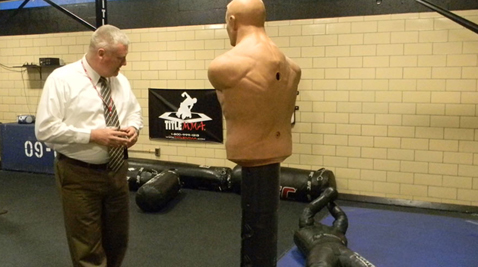By Kaitlin Bulavinetz and Glynnesha Taylor
Special to Capital News Service
BALTIMORE – Scott Davis recently received a call about a man in Montgomery County who was wielding a knife, convinced that there were people trying to kill him. A situation that could have ended badly was resolved peacefully, however, because of the communication techniques used by the police officers who responded.
“The officers realized he was delusional and used de-escalation skills to calm him down,” said Scott Davis, Crisis Intervention Team coordinator for the National Alliance on Mental Illness’ Montgomery County division.
The man was taken to a hospital rather than a police station for booking.
The case highlights how a police officer trained in handling a person who has a mental illness can positively alter the outcome of a crisis situation, Davis said. And it underscores the reason so many local police departments around the country have reached out to national advocacy groups to assist them in cultivating well-rounded training programs, especially in handling people with mental illness.
Police training directors in Maryland have formed partnerships with the National Alliance on Mental Illness and embraced the Crisis Intervention Training program, or the Memphis Model, to guide officers in dealing with mentally ill people in crisis.
According to a 2009 NAMI report, CIT programs were active in Maryland and 46 other states.
Montgomery, Howard, Harford and Prince George’s counties all have dedicated CIT training programs in Maryland, Davis said. Baltimore City police officers are also trained in CIT, said John King, director of police training.
CIT teaches officers “that mental health problems are cross cultural, they’re cross gender — there is no stereotypically mentally ill person,” said Lt. Marc Junkerman, director of police training for Harford County. “It touches everybody in every facet of their life.”
The Maryland Police and Correctional Training Commissions require every recruit to take a 1,040-hour, 26-week course covering the basics of law enforcement, including a section on handling people who have a mental illness.
Some say this isn’t enough training on mental illness, and that’s where CIT and other programs like it come in. CIT requires 40 hours of training on mental illness, including de-escalation training, role-playing and learning from those who have mental illnesses about their experiences.
Each police department works with mental health professionals and advocates to tailor the training program to their own needs, which vary from state to state and jurisdiction to jurisdiction.
“Chicago does a training block on what they call urban trauma, because so many of the young people they deal with have witnessed violence or have been victim to violence,” said Laura Usher, NAMI’s Crisis Intervention Team coordinator.
Maryland mandates that every year officers participate in 18 hours of refresher in-service training, which covers all aspects of law enforcement, not just handling people who have a mental illness.
Baltimore City officers are required by their police department to participate in 22 additional hours of in-service training each year beyond the state’s mandated 18. New recruits are required to attend Behavioral Emergency Services Team training, which teaches them basics in interacting with a person in mental illness who needs police attention. Part of the manual includes CIT training.
In Harford County, all new officers receive additional training called Mental Health First Aid, a 12-hour program mandated by the Mental Health Association of Maryland to teach officers how to identify a person in a state of mental crisis. It focuses on a broad range of mental disorders including substance disorders, eating disorders and problems that could lead to suicide attempts, Junkerman said.
Harford County officers who express a desire for additional training in handling people with mental illness are allowed to receive CIT training.
“Just like you have more advanced people to investigate accidents, we have people who are trained to assist in mental illness-type situations,” Junkerman said. “We look for officers who’d rather be peace officers rather than a police officer. They’re problem solvers; they’re people who are good with the public.”
The additional CIT training runs four consecutive days from 7 a.m. until 5 p.m., Davis said. Ninety of Harford County’s 567 sworn-in personnel are trained in CIT.
These officers often assist other officers who are not trained in CIT.
Usher said being part of a special program motivates officers to excel. “I like the idea that officers feel like there’s a special honor of being part of the program,” she said.
The work takes skill. Outside the force, most people who practice de-escalation skills are therapists working in a controlled setting, such as their office, Usher said. “It’s a challenge to transfer those skills to a cop who is working on the street in a really unpredictable setting,” she said.



You must be logged in to post a comment.